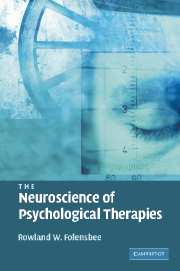Book contents
- Frontmatter
- Contents
- Acknowledgements
- 1 Introduction
- Part 1 Basic concepts
- 2 Neuropsychological concepts
- 3 Neural networks
- 4 Memory and learning
- 5 Affect
- 6 Anxiety
- 7 Processes of brain development
- 8 Themes of brain development
- 9 Basic concepts: summary and integration
- Part 2 The process of psychotherapy
- Appendix: Neuroimaging and psychological therapies
- References
- Index
4 - Memory and learning
Published online by Cambridge University Press: 15 December 2009
- Frontmatter
- Contents
- Acknowledgements
- 1 Introduction
- Part 1 Basic concepts
- 2 Neuropsychological concepts
- 3 Neural networks
- 4 Memory and learning
- 5 Affect
- 6 Anxiety
- 7 Processes of brain development
- 8 Themes of brain development
- 9 Basic concepts: summary and integration
- Part 2 The process of psychotherapy
- Appendix: Neuroimaging and psychological therapies
- References
- Index
Summary
Memory can be defined as the process whereby “knowledge is encoded, stored, and later retrieved” (Kandel et al., 2000a, p. 1245). On its surface, such a definition hints the brain is a static recording device waiting to take in and store the input offered to it. This is not the case. Instead, the brain interacts with the environment, including the external world and the person's own body, in multiple dynamic ways and changes form in response to these interactions. The form the brain takes subsequently influences its interactions with the environment in the future. Stated another way, “Memory is thus the way the brain is affected by experience and then subsequently alters its future responses” (Siegel, 1999, p. 24). Psychotherapy can be viewed as a process of recognizing how the brain has been shaped by its past and then applying this recognition to develop better ways to use the brain in future interactions with the world.
Memory can be viewed at various levels, each of which can offer different insights into human function. Global effects of experience on brain development can be viewed as one aspect of memory. Intracellular processes have been identified that support various memory processes. Connections between cells support memory in several ways, each of which offers its own implications for the development and maintenance of memories. Important processes related to intercellular connection include the strengthening of individual connections, long-term potentiation, habituation, and sensitization.
- Type
- Chapter
- Information
- The Neuroscience of Psychological Therapies , pp. 29 - 40Publisher: Cambridge University PressPrint publication year: 2007



